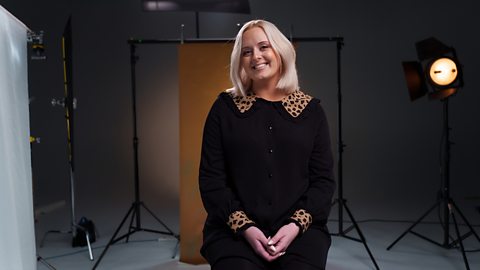[Caller] Hi, I’m Sam and I didn’t know who to talk to so, okay…
I feel overwhelmed at myself recently
As I’m ashamed of what my body looks like and I find it really hard to accept who I am.
It’s mostly triggered when I’m watching TV or looking at social media and I see people with bodies I want
And I find really hard to accept that I’m not like that
and I just feel so hopeless
[Zara] Social media can be such a powerful tool to help us connect with people
and to stay up to date with the things that are happening in our friends’ lives
but it can also have a negative effect on how we feel.
You are not alone in how you’re feeling. I have struggled with my self-esteem and self confidence.
When I was young I would look at the people on TV and even the older girls in my school and think
Ugh, I want to look like them, I want to have their clothes,
I wish I had their bodies and I would even start to act like them.
Even now I can have moments of insecurity when scrolling on social media
and if you let it you can get yourself into a really horrible downward spiral of thinking and feeling like that
When I first came into the public eye after appearing on a dating show a few years ago,
I all of a sudden just had this massive social media presence overnight.
Everything changed and people were, all of a sudden, talking about me online
It really affected me, I experienced some of the best moments and the worst moments all at the same time.
I remember someone posting a picture of me in a bikini
And seeing hundreds on hundreds of hurtful comments about my appearance.
I did not understand how people could be so hurtful and why people would say these things
And this really affected my self-esteem, I started to question my appearance
And it really just made me feel so terrible about myself.
We've got to remember that just because they say it, doesn’t necessarily mean it’s real or true.
We should never be mean and make other people feel they aren’t enough by posting hurtful things online.
It’s important to remember that when we are scrolling we are just seeing a small snapshot of someone's day
or a perfectly posed picture. We do not know what is going on behind the screen.
We don’t know that the person isn’t feeling anxious or low,
We are just seeing what they want us to see
The images and videos that we see are likely to have been airbrushed, or had filters applied,
Or been taken at the most flattering angle, or be 1 of 100 of other images that aren’t perfect.
I know this because I use social media myself
I know how to create a post or a photo that looks like I am living my best life
when sometimes that might be very different from how I’m actually feeling
Or you might see a photo where I look like I’m perfectly posed but
you only need to look at my photo library to see the thousands of pictures, genuinely thousands of pictures
That I’ve taken where I look less than perfect,
I just chose the one where I thought I looked best
Whenever you are looking at someone's profile or posts
it is so important to remember we are all guilty of only posting the good parts of our lives,
If you’re having a low moment about your self-esteem I think it's important to remember
that nothing ever stays the same for long, that’s something my mum always told me.
Life changes and moves on and that negative feeling you're experiencing will change too.
Our bodies are all amazing powerful things that should be celebrated,
no two people are the same and we need to embrace those things that make us unique.
If you are struggling with your self-esteem then there are some great activities that Alex,
our mental health expert, is going to share that might help you feel a little bit better.
[Alex] As Zara said, social media can be such a great way to connect with people and friends
and to stay up to date with what's happening around us,
but it can also have an impact on how we feel and can affect our self-confidence.
If social media is having a negative impact on you
or you’re feeling low when you’re using it, then there are some things that you can do.
It can be helpful to try not to compare yourself to other people you see online, or in the media.
It’s important to remember that nobody’s perfect,
Not everything that you see will always reflect what is really going on
And people don’t tend to share the moments where they are struggling too.
Try writing down three things you like about yourself and read it every morning.
This can be a lovely way to start the day and improve how you feel about yourself.
It’s really important to delete anyone who is saying unhelpful or hurtful things about you.
Instead, you could try following someone new who posts inspirational messages
that will help build your self-esteem.
If notifications and updates are becoming too much,
then decide on when and how often you want to receive these.
You can shut this off whenever it feels like too much.
It can also really help to go outside and get some fresh air
or do an activity that you love to take your mind off what is going on online.
Remember to always be nice to others.
You don’t know what might be happening behind the screen for someone else
and hurtful comments can have a real impact on someone's wellbeing and confidence.
Why not give some of these activities a go?
and remember that you’re not alone in feeling how you feel
I have felt exactly how you are feeling and you need to learn to love you and every part of you.
You’re unique and that’s what makes you special.
You should always tell someone about the things you’re worried about.
You can tell a friend, parent, guardian, a teacher or another trusted adult.
There are also links to so many helpful organisations on the BBC Action Line website.
In this film we meet Sam who struggles with his self-image. Sam is played by an actor and his story is a reconstruction based on a real call to Childline. He feels his body doesn’t look like those he sees on social media and he struggles to accept himself as he is.
Television presenter Zara McDermott talks about how her social media affects her own self-confidence. She likes to create engaging and attractive social media content but warns that the pressure of trying to look a certain way and show a certain lifestyle can be stressful. She also reminds us that things on social media are not always what they seem and explains that she often takes many photos before finding one she is happy with. We only see a small snapshot of someone’s life and don’t know what is going on behind the scenes. Added to this, people can be cruel and unkind on social media and sometimes forget that there is a human being behind the profile picture.
Alex, the expert from Childline suggests ways that everyone can navigate social media more easily. His advice includes the following steps:
- Don’t compare yourself to others, nobody is perfect
- Try writing down three things you like about yourself
- Delete or unfollow negative people
- Turn off notifications if they become too much
- Go outside or do an activity that you love
The reconstructions are based on real calls from Childline service users, but are not necessarily direct quotes. All names and potentially identifying details have been changed to protect the identity of the child or young person involved.
Before watching the film
Set up a working agreement or set of group rules before watching the film. Make it clear that there is no pressure on students to share any personal experiences. They can talk about the characters in the phone call reconstructions and the contributors’ experiences instead. Remind students that the classroom is be a safe space to discuss and share thoughts if they wish to, and that they should be aware of and respect others’ opinions and experiences. Remind them also that you cannot guarantee absolute confidentiality but will talk to individuals if you have any concerns. The agreement should include how and where to access support if needed.
People of different genders, backgrounds and cultures may approach their mental health in different ways. Talk about the pressures on young people and whether gender makes a difference. Be sensitive that young people from some cultural backgrounds may not find it easy to talk about mental health and remind them they don’t have to talk about themselves. Use the distancing technique to ensure that the students feel safe and comfortable talking about the issues in the films. Talk about what the contributors say or talk about ‘someone who.’
Open up a general discussion about mental health and as a group come up with words they associate with the topic of the film. Remind the students that if they need any support at any point they can ask, either during or after the lesson.
After watching the film
- What advice would you give to someone who is feeling overwhelmed or anxious about social media?
- What techniques could a young person like Sam use to help them manage their social media use?
- How easy is it to follow Alex’s suggestion of coming up with three things you like or love about yourself? Try it and see if it becomes easier when you do this every day.
As a group talk about ways that everyone can support each other with their mental health. You may even want to create a class charter around more positive mental health or encourage each student to make a list of three practical things they can do to support their own positive mental health.
Make sure that students are supported in their own mental health and wellbeing by signposting support that is available in school, locally and nationally. Remind them that they can always speak to their GP or local services.
Remind students that if they or someone they know has suicidal thoughts then it is important to get help immediately. This is not something they should have to deal with alone.
More resources in this collection
Time to talk about... anxiety with Tom Grennan. video
Tom Grennan discusses his own experiences with anxiety, alongside real-life testimony and expert advice.

Time to talk about... mental wellbeing with Wes Nelson. video
Wes Nelson discusses his own experiences with mental wellbeing issues, alongside real-life testimony and expert advice.

Time to talk about... stress with Katie Thistleton. video
Katie Thistleton discusses her own experiences of stress, alongside real-life testimony and expert advice.

Time to talk about... depression with Roman Kemp. video
Roman Kemp discusses his own experiences of depression, alongside real-life testimony and expert advice.
